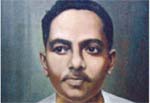 Today is the 59th anniversary of death of the greatest modern poet of Bangla literature Jibanananda Das (February 18, 1899 to October 22, 1954).
Today is the 59th anniversary of death of the greatest modern poet of Bangla literature Jibanananda Das (February 18, 1899 to October 22, 1954).
Initially being influenced by Rabindranath Tagore’s romanticism, Das later developed his unique style of poetry in terms of dealing with nature and writing poems as well as darker themes like depression, frustration, and loneliness of modern urban life in his poems.In fact, Jibanananda Das was the forerunner of the group of poets who tried to step out of the Tagore’s poetic influence in 1930s.
He introduced prose style in Bangla poetry. He has also created a distinctive diction style in poetry by incorporating apparently ‘unusual words’ in poems in context of those days like thyang (leg), sharir (body) and others.
He was also a novelist, short story and a non-fiction writer. The poet also wrote a few essays in English on the then contemporary Bangla literature.
Jibanananda Das was born in Barisal in 1899 to Satyananda Das and Kusumkumari Das. After passing intermediate from BM College, he migrated to Kolkata and completed his bachelor with honours in English and master in the same subject from Presidency College in Calcutta.
Jibanananda started writing and publishing in his early 20s. During his lifetime he published only 269 poems in different journals and magazines, of which 162 were collected in seven anthologies including Jhara Palak, Bela Obela Kalbela and others.
But the poet’s unique talent was realised only after his death with the discovery of his scattered manuscripts. As a result, the numerous discovered novels and short stories were published posthumously. Subsequently, Das was recognised as the most popular poet of modern Bangla literature in the middle of the last century.
Many of his poems like Bonolata Sen, Ruposhi Bangla and others are taught at different educational institutions as part of their curriculum.
Jibanananda Das protested against the wrong-doings in the society through his poems as well. And this inspired the pride in Bengali nationhood especially in the 1960s and during the war of independence in 1971.
The poet died at the age of 55 in a tram accident in Kolkata in 1954.
-With New Age input




















